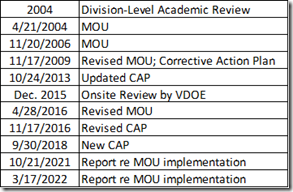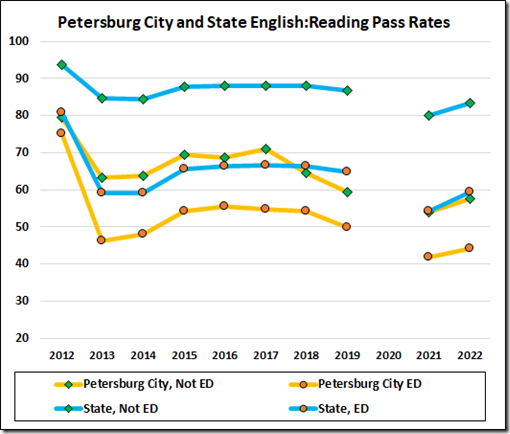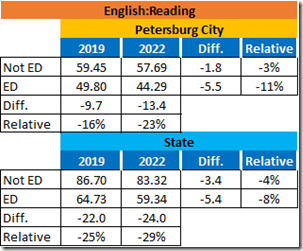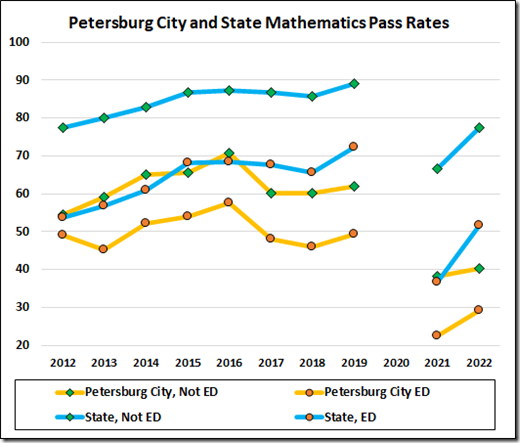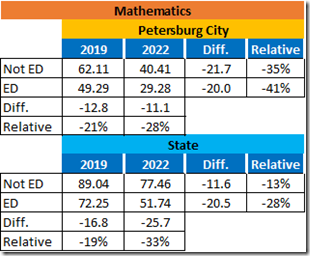Despite eighteen years of “supervision” by the Board and Department of Education, the Petersburg schools marinate in failure.
Va. Code § 22.1-8 provides: “The general supervision of the public school system shall be vested in the Board of Education.”
Va. Code § 22.1-253.13:8 provides:
The Board of Education shall have authority to seek school division compliance with the foregoing Standards of Quality. When the Board of Education determines that a school division has failed or refused, and continues to fail or refuse, to comply with any such Standard, the Board may petition the circuit court having jurisdiction in the school division to mandate or otherwise enforce compliance with such standard, including the development or implementation of any required corrective action plan that a local school board has failed or refused to develop or implement in a timely manner.
Documents on the VBOE Web pages show the following events as to Petersburg:
“MOU” is bureaucratese for “Memorandum of Understanding,” which in turn is an edict to which the Board can point in order to claim it is doing something about lousy schools. The MOU process demands a Corrective Action Plan (“CAP”) that sets forth “specific actions and a schedule designed to ensure that schools within [the affected] school division meet the standards established by the Board.”
The 2022 SOL data now are out; they show the results of the eighteenth year of the Board’s attempts to improve the Petersburg schools.
On average, Virginia’s economically disadvantaged (“ED”) students underperform their more affluent peers (“Not ED”) by about 20%. The SOL average pass rate thus is lowered for the divisions with larger ED populations. To avoid the Biased SOL average, let’s look at the underlying averages for the ED and Not ED groups.
First off, the recent reading pass rates for Petersburg and the state.
Notes: The decreases in 2013 were the result of the adoption of newer, tougher reading tests. The 2022 results were boosted, no telling how much, by the adoption of a “less rigorous” grading scheme. There was no SOL testing in 2020. Participation in the 2021 testing was voluntary; in that year, 75.5% of students took the reading assessment, 78.7% took math, and 80% took science. So, the ‘22 data are the first, post-pandemic numbers with a claim to measuring anything beyond individual performance.
Notice that Petersburg’s 2022 Not ED pass rate is below the ED average for the state. But also notice that the COVID school closures had roughly the same effect (as mitigated by the scoring boost) in Petersburg as in the state.
Of course, once one is in the basement, it’s hard to go lower: 42.3% of Petersburg’s Not ED students flunked the ‘22 reading test; 55.7% of the ED.
The math tests enjoyed their scoring boost in 2019, so the data from that year compare directly with the 2022 numbers.
To the point here, the 2022 Petersburg results again show ongoing deterioration. Despite eighteen years of “supervision” from the Board and Department of Education, Petersburg wallows in failure.
The Board has yet to sue any school division, much less Petersburg, under the authority of § 22.1-253.13:8. Indeed, any such suit would fail: To get the injunction, the Board would have to tell the judge what Petersburg (or Richmond or . . .) could do to meet the standards.
Isn’t it long past time for the senior bureaucrats at the Department of Education to be directed to employment that is better suited to their talents and for the Northam-appointed members of the Board to be fired for malfeasance?
